
Marvin Pentz Gay Jr., who also spelled his surname as Gaye, was an American R&B and soul singer and songwriter. He helped to shape the sound of Motown in the 1960s, first as an in-house session player and later as a solo artist with a string of successes, earning him the nicknames "Prince of Motown" and "Prince of Soul".

What's Going On is the eleventh studio album by American soul singer Marvin Gaye. It was released on May 21, 1971, by the Motown Records subsidiary label Tamla. Recorded between 1970 and 1971 in sessions at Hitsville U.S.A., Golden World, and United Sound Studios in Detroit, and at The Sound Factory in West Hollywood, California, it was Gaye's first album to credit him as a producer and to credit Motown's in-house studio band, the session musicians known as the Funk Brothers.

Easy is an album recorded by Marvin Gaye and Tammi Terrell, and released by Motown Records on September 16, 1969 under the Tamla Records label. One song on the album, "Good Lovin' Ain't Easy To Come By", was a hit single and remains popular to this day. Terrell had been ill, suffering from complications caused by a brain tumor, since the fall of 1967. Marvin Gaye later claimed that as a result, most of the female vocals on this album were performed by Valerie Simpson, who served as co-songwriter and co-producer for the LP with her boyfriend and future husband Nickolas Ashford.

Let's Get It On is the thirteenth studio album by American soul singer, songwriter, and producer Marvin Gaye. It was released on August 28, 1973, by the Motown subsidiary label Tamla Records on LP.
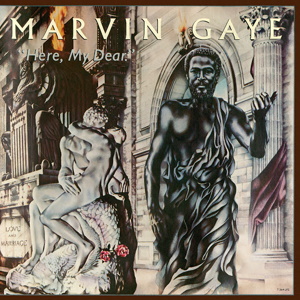
Here, My Dear is the fifteenth studio album by music artist Marvin Gaye, released as a double album on December 15, 1978, on Motown-subsidiary label Tamla Records. Recording sessions for the album took place between 1977 and 1978 at Gaye's personal studios, Marvin Gaye Studios, in Los Angeles, California. The album was notable for its subject matter focusing largely on Gaye's acrimonious divorce from his first wife, Anna Gordy Gaye.

"Let's Get It On" is a song by soul musician Marvin Gaye, released June 15, 1973, on Motown-subsidiary label Tamla Records. The song was recorded on March 22, 1973, at Hitsville West in Los Angeles, California. The song features romantic and sexual lyricism and funk instrumentation by The Funk Brothers. The title track of Gaye's album of the same name, it was written by Marvin Gaye and producer Ed Townsend. "Let's Get It On" became Gaye's most successful single for Motown and one of his most well-known songs. With the help of the song's sexually explicit content, "Let's Get It On" helped give Gaye a reputation as a sex symbol during its initial popularity. "Let's Get It On" is written and composed in the key of E-flat major and is set in time signature of common time with a tempo of 82 beats per minute.

"I Want You" is a song written by songwriters Leon Ware and Arthur "T-Boy" Ross and performed by singer Marvin Gaye. It was released as a single in 1976 on his fourteenth studio album of the same name on the Tamla label. The song introduced a change in musical styles for Gaye, who before then had been recording songs with a funk edge. Songs such as this gave him a disco audience thanks to Ware, who produced the song alongside Gaye.

I Want You is the fourteenth studio album by American soul singer and songwriter Marvin Gaye. It was released on March 16, 1976, by the Motown Records-subsidiary label Tamla.
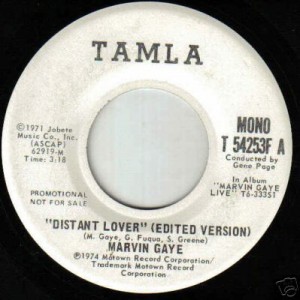
"Distant Lover" is the sixth song issued on singer Marvin Gaye's 1973 album, Let's Get It On and the B-side of the second single from that album, "Come Get to This". A live recording was issued as a single in 1974. The live version of the song was Gaye's most successful single during the three-year gap between Let's Get It On and his following 1976 album, I Want You.

You're All I Need is the second studio album by soul musicians Marvin Gaye and Tammi Terrell, released in August 1968 on Motown-subsidiary label Tamla Records. Highlighted by three hit singles written by Nickolas Ashford and Valerie Simpson, You're All I Need was recorded throughout 1966 and 1967 and features two Top 10 Billboard Hot 100 hits, "Ain't Nothing Like the Real Thing" and "You're All I Need to Get By". It peaked at #60 on the U.S. Billboard 200 Album Chart. You're All I Need was the two singers' final collaboration effort, as Terrell would become ill following recording, before succumbing to a brain tumor in 1970.
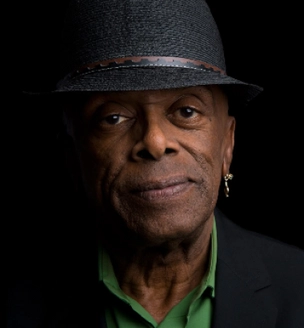
Leon Ware was an American songwriter, producer, composer, and singer. Besides a solo career as a performer, Ware was best known for producing hits for other artists including Michael Jackson, Quincy Jones, Maxwell, Minnie Riperton and Marvin Gaye, co-producing the latter's album, I Want You.
"After the Dance" is a slow jam recorded by singer Marvin Gaye and released as the second single off Gaye's 1976 hit album I Want You. Though it received modest success, the song was widely considered to be one of Marvin's best ballads and served as part of the template for quiet storm and urban contemporary ballads that came afterwards.

Live at the London Palladium is a live double album by soul musician Marvin Gaye, released March 15, 1977, on Tamla Records. Recording sessions took place live at several concerts at the London Palladium in London, England, in October 1976, with the exception of the hit single "Got to Give It Up", which was recorded at Gaye's Los Angeles studio Marvin's Room on January 31, 1977. Live at the London Palladium features intimate performances by Gaye of many of his career highlights, including early hits for Motown and recent material from his previous three studio albums. As with his previous live album, Marvin Gaye Live!, production of the record was handled entirely by Gaye, except for the studio portion, "Got to Give It Up", which was managed by Art Stewart.

Eddie "Bongo" Brown was an American musician born in Clarksdale, Mississippi, and raised in Memphis, Tennessee. Brown played congas, bongos, the gourd and claves for Motown Records' in-house Funk Brothers band. One of his musical influences was Chano Pozo.

"I Wanna Be Where You Are" is a song written by Arthur "T-Boy" Ross and Leon Ware for Michael Jackson, who took the song to number 7 in Cash Box and number 16 on the Billboard Hot 100 pop chart. It also reached number 2 on the Billboard R&B singles chart in 1972.
"Since I Had You" is a quiet storm-styled soul song recorded by singer Marvin Gaye for the I Want You album. The song was co-written by Gaye and the album's producer, Leon Ware.
James Edward Gadson is an American drummer and session musician. Beginning his career in the late 1960s, Gadson has since become one of the most-recorded drummers in the history of R&B. He is also a singer and songwriter.
Marvin Gaye was an American music artist and singer-songwriter who won acclaim for a series of recordings with Motown Records. Gaye's personal life, mainly documented in the biography, Divided Soul: The Life of Marvin Gaye, included religious faith, child abuse by his father, personal relationships with his two wives, friends and girlfriends, and bouts with depression and drug abuse.
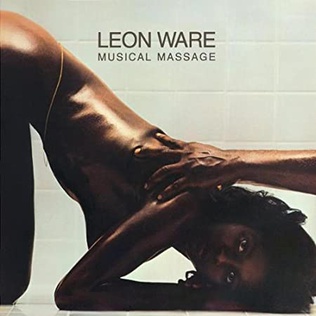
Musical Massage is an album by Leon Ware released in 1976. This was his second solo album and his only release for Motown's Gordy Records subsidy.
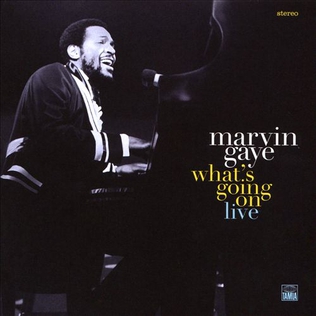
What's Going On Live is a live album recorded in 1972 by American soul singer Marvin Gaye and released posthumously in 2019 by Motown. The album documents a live performance of his album What's Going On and has received mixed feedback from critics.
















